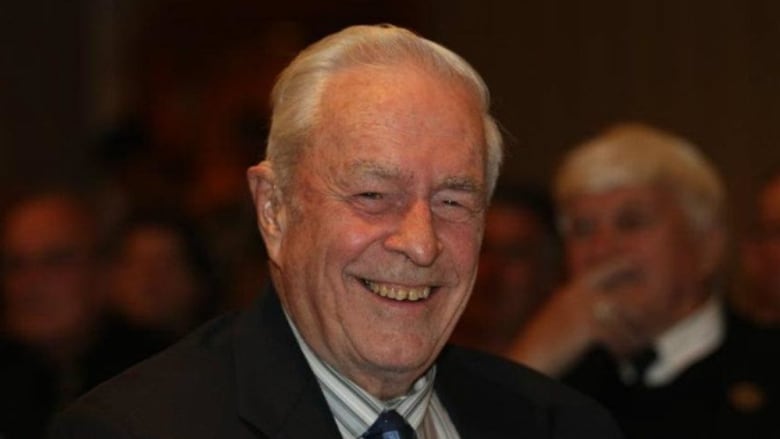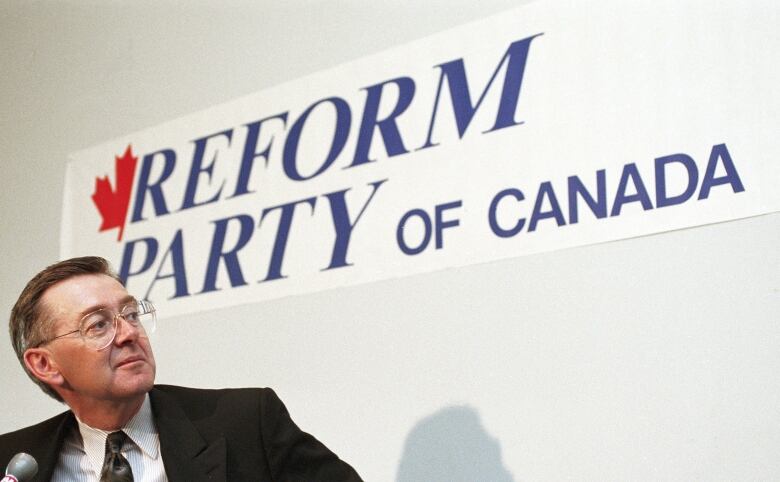Ted Byfield, iconic Alberta conservative publisher, dies at 93
Byfield founded conservative weekly newsmagazine Alberta Report in 1979

Ted Byfield the conservative Alberta journalist and publisher who founded the influential and often controversialnewsmagazine Alberta Reporthas died at 93.
After Byfield founded Alberta Report in 1979, thestaunchly conservative publication became a key voice for sentiments of Western alienation in the Canadian Confederation.He was a prominent figure in the nascent days of Preston Manning's Reform Party.
The Report was also no stranger to controversy, fielding accusations of racist, homophobic and anti-feminist material.
Ted's son, Vincent Byfield, announced Byfield's death on his Facebook page on Friday.
"Ted Byfield drew his last breath peacefully in his home surrounded by family at 9:16 p.m. Thursday, December 23rd, 2021," he said.
Alberta's premier was among those who took to social media to remember Byfield.
Premier Jason Kenneyeulogized Byfield in a series of tweets, calling him"aremarkable man and a great Albertan" who "had an enormous impact on Canadian journalism and politics."
"Ted was a friend to me and countless others. He was one of the first people to welcome me to Alberta when I arrived here from [Saskatchewan] over 30 years ago."
"He will be missed. He was a giant who changed Canada and fought the tide to the last. He cannot be replaced," tweeted Jonathon Van Maren.
"Alberta has lost one of its iconic figures in the #journalism industry. RIP Ted Byfield," tweeted Mario Toneguzzi.

Author and political commentator David Frumonce wrote that "any future historian trying to understand Canada's troubles in the late 20th century will want to look at Mr. Byfield's work."
"Unless you've read Mr. Byfield, you won't ever properly understand the anger of the West at Central Canada, the reasons for the destruction of the once-unbreakable Conservative grip on the West, and the birth of the Reform Party," Frum wrotein the preface to Byfield's 1998 collection of back page essays,The Book of Ted.
Magazine's rise fuelled by hatred of theNEP
The Alberta Report began its life in 1973 as the St. John's Edmonton Report, a publication produced by the Company of the Cross, an Anglican lay order founded by Byfield and Frank Wiens that ran three boys boarding schools.
Byfield himself was an adult convert to traditional Anglicanism and was particularly influenced by the work of Christian apologist C. S. Lewis.
The magazine, in his conception, functioned to serve two roles: as a traditional newsmagazine, but also, through its opinion columns, as a tool to draw readers to the Christian faith.

In 1979, as the magazine morphedinto the Alberta Report, Byfield found himself a federalfoe. A situation began to emerge in Alberta in 1980 that sounds a lot like the Alberta of 2020.
The prime minister was Pierre Trudeau, the oil industry in Alberta was going through a tumultuous period, and prominent conservatives in the province were flirting with the concept of separation, whether as a legitimate threat or an advantageous bluff.
In 1980, Trudeau introduced the National Energy Program, an initiative the federal government said would make Canada self-sufficient as an oil producer by 1990.
But critics in the West saw the program as the Trudeau government encroaching into provincial affairs and it was in that context that Byfield took to the pages of the Report in a hot fury.
In Byfield's view, the implementation of the NEP signalled that Trudeau was no longer simply "indifferent" to Western Canada that, for a multitude of reasons, he now "hated" Western Canada.
"It is the hatred of the socialist for the individualist, the cold fear of the high-born for the self-made, the aversion of the theorist for the pragmatist, the derision of the urbanist for the peasant, the disdain of the intellectual for the uncouth, the contempt of the Gaul for the Slav," Byfield wrote on Nov. 7, 1980.
"All these hatreds have helped to dictate the posture of the Trudeau government towards the West, and on Tuesday, the 28th of October [the day the NEP was introduced], they were paraded before the nation in the form of public policy."
Former Maclean's senior writer D'Arcy Jenish, the Report's first Ottawa bureau chief, had joined the magazinea year prior just as Joe Clark's short-lived federal Progressive Conservative government fell. He remembered howthe arrival of the NEP landed like a bomb in Alberta, and being at the Report gave him a "seat at the edge of the volcano."
"[Byfield's] rage incited and maybe inflamed public opinion a little bit. It responded to a visceral feeling amongst Albertans that they were really getting screwed over by the government," Jenish said.
"Ted kind of articulated what people were feeling viscerally, but weren't exactly capable of expressing."
Strong political influence
As the Report'scontent covered continued to diversify with politically charged articles but also stories of fires, medical breakthroughs, lawsuits, sports and art so did its circulation.
At its height, the Report had a subscription base of nearly 60,000, according to the Provincial Archives of Alberta.
Byfield's connections with those in power grew, and staffers began to notice his increasingly frequent meetings with individuals like longtime Alberta Premier Peter Lougheed and eventual Reform Party founder Preston Manning.

The magazine became a home for resentment and grievances against Confederation, arguing that Western provinces had been unfairly treated and should have more power over national economic policies.
Byfield's perspectivehelped shape the direction of the statement of principles and policies eventually adopted by the Reform Party.
The Reform Party was eventually succeeded by the Canadian Alliance, which became the launching pad for future prime minister Stephen Harper, who in a letter signalled the influence of Byfield on the larger conservative movement at a reunion of magazine staffers in 2011.
"I sincerely regret that I am unable to attend your gathering of Report magazine alumni, and many others who were part of the 25-year journey from the birth of the Reform Party to this year's election of a national majority government for the new Conservative Party of Canada," Elise Byfield, Ted's granddaughter, read from Harper's letter during the event.
A complicated legacy
The Report, alongside its more traditional news content, was no stranger to controversy.
Among other things, it was fiercely against homosexuality.
"If adultery or homosexuality is wrong in the sight of God, then all the task forces in Christendom aren't going to make it right. If God is timeless and changeless, then human conduct considered wrong in the eighth century is just as wrong in the twentieth," Byfield wrote in a column featured inThe Book of Ted.
Some writers felt that some stories printed in the pages of the Report went beyond a religious perspective and became something vicious.
"We would sort of pick on if there was a gay guy and something happened and he was to blame to something, that would become a big story because it showed how deviant or reprehensible gays were," said Mathew Ingram, who started at the Report in 1987 and went on to become the chief digital writer for the Columbia Journalism Review.
"And the same thing with feminists or anyone else that was 'evil.' I don't feel good about it."
For those who came to Alberta after the magazine folded in 2003 and its obvious influence faded, some of the columns and editorials from its alumni can be jolting when they resurface years later.
That was the case forKenney'sformer speechwriterPaul Bunner, who retired in 2020 after coming under fire for having penneda number of columns for Alberta Report that modern critics called racist and discriminatory. In the past few years, there were also calls for the resignation ofAlberta social studies curriculum adviserChris Champion, who in the pages of the Reportonce suggested victims of school sex abuse scandals and forced sterilization were seeking profit from their past.
Byfield's son Link, who had taken over aspublisher of Alberta Report in the mid-1980s, predeceased his father in 2015 when he died of cancer at the age of 63.
Alberta Report ceased publication in 2003 after years of financial difficulty.
- To find out more about the complicated legacy of Alberta Report, see:A voice echoes in the West
With files from the CBC's Joel Dryden












_(720p).jpg)


 OFFICIAL HD MUSIC VIDEO.jpg)
.jpg)



























































































